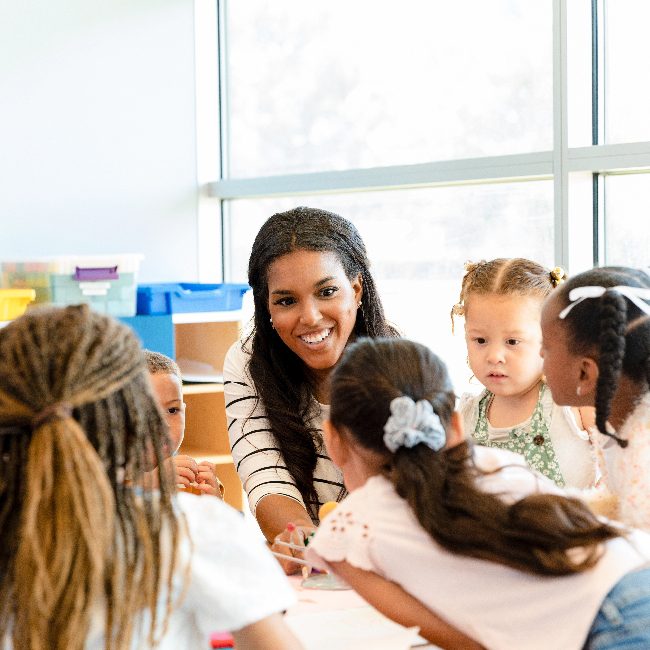- Programs
- For Providers & Educators
- For Communities
- For Parents & Families
- Advocacy & Policy
- Research
- Make an Impact
- About IAFC
“The best gatherings learn to cultivate good controversy by creating the conditions for it because human connection is just as threatened by unhealthy peace as by unhealthy conflict.” – Priya Parker
Community Systems Statewide Supports (CS3)
Our annual conference Equity from the Start: Reimagining the Early Childhood System took place June 8-10, 2021. We were joined by early childhood stakeholders all around the state to convene, learn, and grow. Thanks to everyone who participated and supported the event! Session evaluations and the overall conference evaluation link will remain open through Thursday, June 17, 2021. For each survey you complete, you will be entered into a raffle to win a copy of Glenn Singleton’s Courageous Conversations About Race: A Field Guide to Achieving Equity in Schools.
During our annual conference, we launched a new suite of resources around engaging parents in early childhood collaborations. We created a handbook that helps collaborations develop a strategy for engaging parents in the work, a new on-demand learning course specifically designed for collaboration members on family engagement, and several videos capturing parent perspectives on their work in collaborations. You can find all of these through our Partner Plan Act website.
We have released the annual Training Needs Assessment. This is an opportunity to inform future content of our On-Demand Learning courses, Partner Plan Act conference sessions, and regional trainings. Share the needs assessment survey with other community collaborations. We want to hear from you! The survey closes on June 30, 2021.
The fourth cohort of the Partner Plan Act Collaboration Institute launches next month! There is still time to join this great training opportunity! Communities can apply as teams to receive coaching and training over the course of a year from our CS3 coaches and trainers. Deepen your collective and individual knowledge on community systems, systems building, and systems change by participating in this free and unique opportunity! To apply and learn more, visit the Partner Plan Act website. Applications are due June 21, 2021.
Collaboration Highlight
Early Childhood Alliance, An Interview with Francesa Pilati
CS3 Lead Trainer/Coach, Ruby Flores, talked with Francesca Pilati of the Early Childhood Alliance (ECA). Francesca was the lead team member of the ECA collaboration and participated in two cohorts of the Partner Plan Act Collaboration Institute (PPACI). She talked with us about their experiences in the Institute over the past two years.
When was the Early Childhood Alliance established and why? What areas does it serve?
Focusing on the villages of Skokie, Niles, Lincolnwood, and Morton Grove, the ECA was formally established with an endorsed charter in 2019. However, a group of people from various community organizations and agencies had been meeting informally for at least two years prior to 2019. The group came together because they noticed a lack of connections between early childhood organizations in the community. They saw a need for increased communication and cohesiveness between entities that serve the same children and families. This informal gathering paved the way for the development of the Early Childhood Alliance.
Why did the team decide to join the third cohort of the Partner Plan Act Collaboration Institute (PPACI)? What were your goals for the year?
Participating in the second cohort of the Institute had been so helpful, that it made sense for them to apply again for additional supports. In their first year, they participated in the Institute’s Coach-Guided learning pathway. As a result, they created a charter and put a governance structure in place. However, they needed additional support with establishing goals and understanding how to move forward with their work. The ECA collaboration decided to continue receiving additional support by applying to be a part of the Institute’s Process-Guided Track to strengthen their collaboration’s collective work. Coincidentally, in the second year of the Institute a second time, ECA created its first paid position for the collaboration. With Rosa Mendez as the new collaboration lead, it made sense to start putting words into action. Their learning goals for the Institute included developing what to work on as a collaboration, looking at community data to identify a targeted problem, building the parent engagement piece included in the charter.
What are some of the things that your team learned through the PPACI?
By participating in the Institute, the team learned both intangible ideas and concrete processes. They learned about the importance of building relationships and partnering with other organizations. They gained a better understanding of systems change and its challenges. This collective knowledge set the foundation for them to learn more about governance structures, conducting system scans and root cause analysis, skills in data collection and analysis, and skills in meeting facilitation.
What are some of the things that your team accomplished through the PPACI?
In the first year, ECA was able to accomplish the creation of a governance structure and a charter that was formally endorsed by 40 organizations from different sectors including government, school districts, libraries, in-home daycares, private childcare, and healthcare. Building from this success, in the second year through PPACI, they formed a steering committee to lead the local systems change process. With training from PPACI, the steering committee was able to lead the community in a process to identify a problem target, complete a system scan and root cause analysis of the early childhood issues, and collect and analyze data from these efforts. This process started an important conversation about partnership and collaboration to fill available spots in fully funded programs within the community.
What was the coaching experience like for the team?
The team’s coaching experience has been amazing. Their coach walked them through each step, sharing her own experience throughout. It has taken a lot of work to accomplish their goals, and their coach has provided both moral and practical support.
What were the most rewarding and most challenging aspects of your participation in the Institute?
Watching the ECA evolve and blossom, becoming a formal organization, being endorsed by other organizations that are passionate about the work, analyzing community data and problem-solving around it, and, most importantly, building strong relationships have all been rewarding. They now feel poised to address the issues that they have identified.
The most challenging aspect has been the inherently deliberate nature of successful collaboration work. Building a foundation of partnership and trust takes time, and sometimes things don’t move as quickly as you’d like. Because everyone comes into the collaboration with their own perceptions, it’s important to step back and make sure that everyone is on the same page.
What advice would you give to collaborations who are considering applying to participate in Cohort Four of the Institute?
Highly recommend it! The entire two years have been so helpful. The Partner Plan Act Collaboration Institute has taken the Early Childhood Alliance’s impact on the community to a whole new level.
If your community collaboration would like to be highlighted in a future e-newsletter, please email partnerplanact@actforchildren.org.
Resources
NonprofitAF
Vu Le is a writer, speaker, vegan, Pisces, and the former Executive Director of Rainer Valley Corps, a nonprofit in Seattle that promotes social justice by developing leaders of color, strengthening organizations led by communities of color, and fostering collaboration between diverse communities. He was also our opening keynote this year for our annual conference. Vu’s blog NonprofitAF tackles many difficult topics within community engagement, fundraising, the nonprofit field, and more with humor and a liberal amount of pictures of adorable animals.
Targeted Universalism: Policy & Practice

From the Othering & Belonging Institute at the University of California-Berkeley comes a framework that can be useful to early childhood community collaborations that are looking to support the children and families in their communities. Targeted universalism means setting universal goals pursued by targeted processes to achieve those goals. Within this framework, universal goals are established for all groups concerned. The strategies developed to achieve those goals are targeted, based upon how different groups are situated within structures, culture, and across geographies to obtain the universal goal. Targeted universalism is goal-oriented, and the processes are directed in service of the explicit, universal goal. Watch a short video about targeted universalism, view a primer, and learn more.
Trainings and Events

- View the CS3 parent engagement video – hear from parents and collaboration staff about their engagement experiences.
- Get access to and review the Handbook for Parent Engagement: Engaging Parents in Early Childhood Collaborations – get a copy of the comprehensive handbook that debuts the CS3 parent engagement framework, a guide to deepening/getting started with your collaboration’s parent engagement, and specific tools for implementing the four most typical collaboration parent engagement
- Obtain hands-on experience with the new parent engagement online course – get started with the on-demand course that walks you through the Handbook in an interactive manner.
- Find out how to get on-demand consultation to support your parent engagement endeavors.
Governance Workshop Series – Fiscal Sponsorship: What is it? How Does it Support Collaboration? | July 15, 2021: 9 – 11 a.m.
Are you hoping to seek grant funds and donations to support the work of your collaboration? Are you wondering about how to manage the finances of your collaboration? Do you have a fiscal sponsor but do not have a written fiscal sponsor agreement? This workshop is for you!
Many collaborations utilize fiscal sponsors to achieve these aims. Do you have questions about fiscal sponsor relationships and how they work? What kinds of agencies serve as fiscal sponsors? What should be included in a fiscal sponsorship agreement? Rebecca Wallenfelsz and Paul Carman, Partners at Chapman and Cutler, LLP will be sharing their knowledge and insights about this important strategy used by collaborations without 501 (c) 3 (nonprofit) status to get access to a wider network of funders, receive tax-deductible donations and grants, and receive technical and administrative support.







